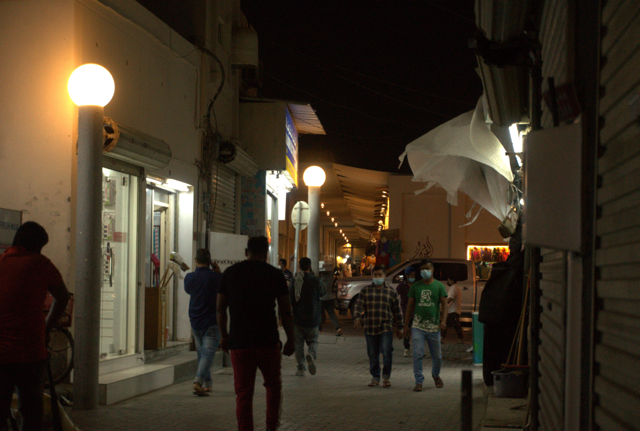Several months on, thousands of migrants workers remain stranded in Saudi. Many worked for Saudi Oger, while others worked for different firms similarly affected by the oil glut, including the BinLadin group. Oger owes 2.5 billion riyal to workers in back and severance pay, according to two sources quoted by Reuters. The construction firm argues that it withheld salaries because the Saudi government has not paid for projects already completed - a bill reportedly totaling to 30 billion riyals. The Ministry of Finance had not made payments on multi-billion-riyal government projects for nearly a year, according to the company. Negotiations between Oger and the government recently fell through, likely prolonging the crisis.
The Saudi government's complicity and its responsibility to intervene in the crisis stems not only from its close relationship with the firm, but is failure to provide solutions in the months leading up to the crisis; the Ministry of Labor (MoL) claimed in March, June, and July that Oger was fined for violating the wage protection law, and that the ministry was working to finalize procedures to pay employees and facilitate travel for those with terminated contracts.
Back in March of 2016, the ministry formed a committee in response to workers’ complaints of nonpayment, promising to either pay employees directly or settle payments for Oger’s projects. In June and July, workers again complained that they have not received payment for seven months, indicating protection and enforcement gaps in the “wage protection system” intended to ensure timely, complete payment of salaries. They staged several protests in Jeddah against the company, and the government's refusal to act. Workers set fire to company cars and buses, interrupted traffic, and shut down a gas station before being shut down by police.
Two months later, there is still no resolution, and the MoL has failed to respond effectively. Pledges to return workers to their home countries for free via a Saudi airline are not enough, and would not mark a fair resolution of the crises; Many of the stranded workers refuse to return home, enduring hunger and squalid conditions across 20 camps, because they fear that if they leave, they will not be paid their due wages and end-of-service benefits. For workers who may owe debt to recruiters, or who have loans against remittances back home, return is a non-option. Given the scale of this case and the media attention paid to it, it may be possible for embassies to negotiate a deal for the workers.
The MoL's unmet promises reflect statements made by Saudi Deputy Crown Prince Mohammed Bin Salman in a Bloomberg interview:
Prince Mohammed: No doubt. The problem with Saudi Oger is different to one we have here in Saudi. We have paid them many installments, but they have debt in and out of Saudi. So as soon as money is transferred to their bank accounts, the bank withdraws it.
Saudi Oger can’t cover their own labor costs. That’s not our problem, that’s Saudi Oger’s. The contract between us and Saudi Oger, we will honor it. But if the bank withdraws our installments and Saudi Oger can’t pay a thing to its own contractors and workers, that’s their own problem. They can take them to court. (emphasis added)
Given the many months workers have waited for their salaries and the many complaints they have lodged with the ministry, workers are clearly unable to realistically take Oger to court.
Some reactions to our initial post highlighted the hostile environments facing these migrant workers; sadly, even the ten holy days of Dhul Hija appeared not to have lightened hearts towards their plight. Stranded workers are relying on the charity of their compatriots, as well as relief provided by their embassies. The company has stopped supplying food, electricity, maintenance, and medical services to the workers camp. Workers rely on food handouts organized by embassies and charities. The hashtag #NoIndianLeftBehind highlights the efforts of local Indian groups to provide relief to the over 10,000 Indians affected by the crises.
Migrant workers from other nationalities have also been affected by the oil glut; over 8,000 Pakistani workers, 10,000 Filipinos, and at least 100 Sri Lankans are similarly stranded due to the economic crises. The Non-Resident Nepali Situation (NRNA) estimates that 10% of the 600,000 Nepalis working in Saudi have been hit by the kingdom's economic recession.
It is worth pointing out that stranded workers are not a rare phenomenon, or a product of this crisis alone – workers are often 'warehoused', brought over to Saudi in masses with the promise of a job for which a finalized contract has not been procured. Only if and when the project begins to implement work do workers actually receive employment. Likely due to the significant international spotlight on this case, Saudi authorities are allowing some workers to transfer to any other company within the country.
Many local employers are likely to take advantage of this readily available labour source, seeing the stranded workers as little more than that - flexible labour supply. As evidenced in Prince Mohammed’s statements, construction workers are often treated as little more than labour input, and their exploitation as the inevitable result of their position in ‘difficult-to-manage’ construction supply chains. From government, to business and individuals, there is a startling dehumanization of the people responsible for the Kingdom’s development. These workers are owed back wages for honest, completed work, their stories verified by Oger and by the government itself – yet a vocal crowd express not only apathy, but an open aggression towards these men. Their protracted plight is abhorrent, but of little surprise.




